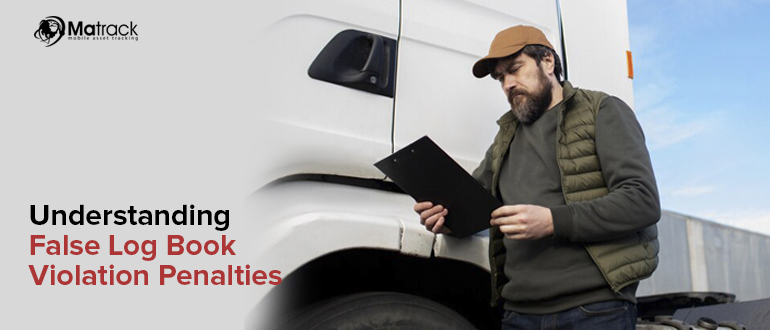Key Takeaways:
- Logbook violations include no logbook, no ELD, falsified records, and failure to maintain duty records.
- Penalties for false logbook entries include fines, license suspension, legal charges, and damage to reputation and safety records.
- Preventing violations involves using ELDs, providing training, setting clear policies, regular audits, and encouraging honest reporting.
- Matrack ELD simplifies compliance with HOS rules through automatic tracking, easy setup, and reliable support.
What Are Logbook Violations?
Logbook violations occur when drivers do not follow rules for recording Hours of Service (HOS) or other required information. Common violations include not having a logbook, false entries, or failing to use an Electronic Logging Device (ELD) when needed.
These violations are serious because they impact safety, compliance, and accountability in the transportation industry.
Common Logbook Violations
No Logbook
If a driver doesn’t have a logbook when required, it violates federal rules. This can lead to fines or suspension, so drivers must always record their hours.
No Electronic Logging Device (ELD)
Drivers are required to use an Electronic Logging Device (ELD) to track their hours. Not having or using an ELD can result in penalties.
Who Doesn’t Need an ELD?
- Short-haul drivers can use time cards instead.
- Drivers using paper logs for eight or fewer days in 30 days are exempt.
- Vehicles made before 2000 or used in drive-away-tow-away operations don’t need an ELD.
Also read: ELD Exemptions
Falsifying Records
Making false entries in a logbook is a serious violation. Drivers may do it intentionally to fake compliance or accidentally, but they must provide proof, like receipts, to correct any mistakes.
No Duty Records
Drivers must keep clear and accurate duty records to prove compliance. Not maintaining these records on paper or with an ELD is a violation and can lead to penalties.
Penalties for False Logbook Violations
False logbook violations can lead to serious consequences for drivers and employers. The penalties depend on the severity of the violation and local regulations.
Fines
The FMCSA can issue fines between $1,000 and $12,000 per offence. Employers who allow or encourage violations may face additional penalties.
License Suspension or Revocation
Repeated or serious violations can result in suspension or loss of a driver’s Commercial Driver’s License (CDL), preventing them from working.
Civil and Criminal Charges
False logbook entries that cause accidents or injuries can lead to lawsuits or criminal charges. Cases involving deaths can result in severe penalties, including jail time.
Impact on Employer Safety Records
False entries can harm an employer’s Safety Measurement System (SMS) score, leading to stricter regulatory scrutiny and potential loss of contracts.
Reputation Damage
Violations harm the reputation of drivers and employers. Poor safety records can result in lost business and reduced opportunities.
How to Prevent False Logbook Violations
Preventing false logbook violations needs effort from both drivers and employers. Here are some simple steps to reduce the risk:
Use ELDs
Switch to electronic logging devices (ELDs) to track hours automatically. ELDs reduce errors and make record-keeping easier for drivers.
Provide Training
Train drivers on Hours of Service (HOS) rules and why accurate logbooks are important. This helps drivers understand how to avoid violations.
Set Clear Rules
Companies should create clear policies for keeping accurate records. These rules must include regular checks and consequences for mistakes.
Check Logs Regularly
Employers should review logbooks often and compare them with fuel receipts or GPS data. This helps spot and fix issues quickly.
Support Honest Reporting
Encourage drivers to report mistakes or fatigue without fear of punishment. Supporting drivers’ well-being helps maintain compliance.
Get Matrack ELD to Avoid Penalties
Matrack ELD helps drivers and fleets follow Hours of Service (HOS) rules easily. The device is free, has no contracts, and costs just $19.95 per month.
It’s simple to set up in five minutes and works with all types of vehicles, including trucks and buses. Key features include automatic HOS tracking, DOT inspection mode, fleet tracking, and IFTA reporting.
Matrack ELD alerts drivers about possible violations and makes compliance easy and affordable. With 99.99% uptime, lifetime warranty, and quick customer support, it’s a reliable choice.
Conclusion
Penalties for false logbook entries are essential to ensuring accuracy and honesty in record-keeping. Violating these rules can result in fines, legal actions, and harm to personal or business reputations.
Drivers and companies need to follow logbook regulations. Maintaining accurate records builds trust, ensures safety, and promotes accountability across industries.
Frequently Asked Questions
How long does reputational damage last for false logbook entries?
Reputational damage can last for years or even permanently. The duration depends on the seriousness of the violation and how effectively the issue is addressed.
Can false logbook entries be settled outside court?
False logbook violations can sometimes be resolved outside of court through negotiations. This depends on the specific case and the laws in the jurisdiction.
How can false e-logbook entries be prevented?
False e-logbook entries can be prevented by using secure authentication methods, encryption, and detailed audit trails. These measures ensure accuracy and accountability.
How long does a log book violation stay on your record?
A logbook violation typically stays on your record for three years, depending on the regulations and the severity of the violation.



